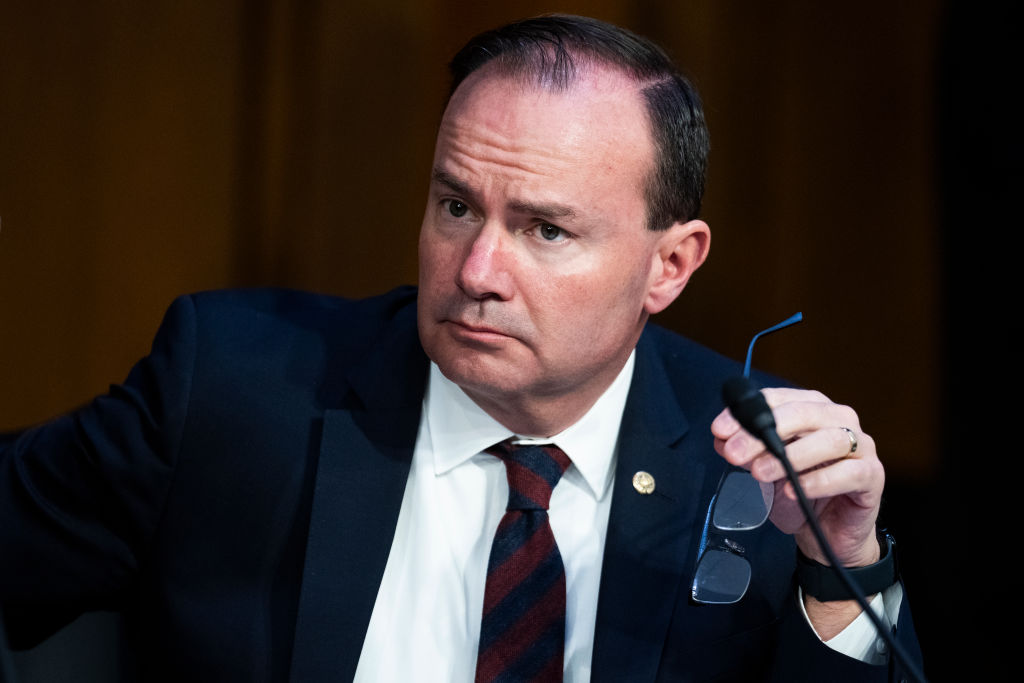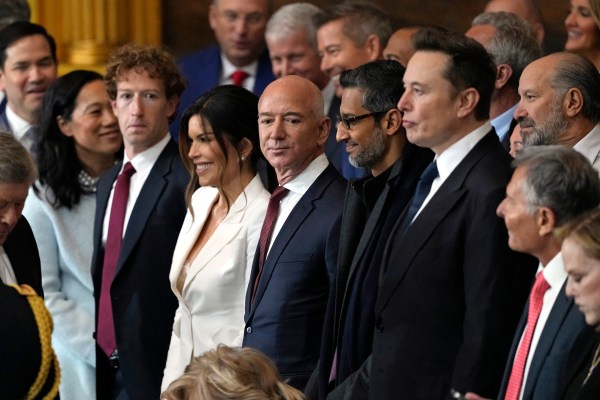Ukraine skeptics and Russia sympathizers on the right lost their most prominent voice when Fox News fired Tucker Carlson last month. But while Carlson might have been the loudest critic of U.S. support for Ukraine, he’s not necessarily the most influential. Shortly before Tucker’s departure, Utah Republican Sen. Mike Lee and 18 other members of Congress released a letter expressing concern that “a proxy war with Russia in Ukraine is not in the strategic interest of the United States and risks an escalation that could spiral out of control.”
Some of the letter’s signatories are frankly cranks. Lee, however, is different. A former law clerk for Supreme Court Justice Samuel Alito, and a top student at Brigham Young University and BYU Law, Lee is generally considered an intellectual heavyweight. He was also just reelected to a third six-year term, and is thus less sensitive to pressure from his constituents. Unlike some who have openly flip-flopped on the issue, and others still trying to have it both ways, Lee has been consistently skeptical about America’s support of Ukraine.
In the letter, which followed months of social media posts to the same effect, Lee makes four main points. First, that we can’t risk provoking Russia because it has nukes. Second, that funding Ukraine is too expensive. Third, that supporting Ukraine is not America’s duty or in America’s interests. And fourth, that it’s all a distraction from the real foe, China, which the war in Ukraine strengthens rather than weakens.
Lee’s arguments represent a worldview that has been foreign to the right’s mainstream for decades, but would have been at home prior to World War II. Russia’s invasion of Ukraine has reopened fissures on the right that were sealed up when Dwight Eisenhower defeated Ohio Sen. Robert Taft for the Republican presidential nomination in 1952. Lee is playing the role of Taft by taking the position that foreign affairs are, in essence, a distraction.
Lee is not entirely wrong that we are risking a wider war, and perhaps a nuclear exchange, with Russia. Whenever nuclear-armed powers are at odds, concerns that things could spiral out of control are legitimate. However, Lee stumbles in assuming that you can be neutral on a moving train.
Putin is a child of the KGB, and a student of Vladimir Lenin’s adage, “You probe with bayonets. If you find mush, you proceed. If you find steel, you withdraw.” He has used this method repeatedly, in Syria, Crimea, and beyond. To allow Ukraine to fall would signal he’d found mush, and proceeding would inevitably follow.
No one doubts the grave danger of a nuclear exchange if Putin invaded a NATO aligned country–putting Russia and NATO in a direct shooting war–and nobody doubts that Putin’s goal is to split NATO. Indeed, Ukraine’s interest in joining NATO was part of Putin’s reason for invading in the first place.
But it is a mistake to believe this possibility can be avoided by washing our hands of the situation. As former chess champion and Putin antagonist Garry Kasparov once explained, “This is how appeasement kills. This is why inaction can be a deadly choice. It raises the stakes, postpones the inevitable, and encourages aggressors to assume they can act with impunity until the eventual response is massive and destabilizing.” History suggests that doing too little is far more dangerous than doing too much when facing an adversary like Putin.
The second objection Lee raises is the cost of the war, which he does in part by pointing to America’s own fiscal situation. His letter reads: “To prop up a foreign government that is historically mired in corruption while the American people suffer from record inflation and a crippling national debt is wildly irresponsible on its own—but to do so while our military contends with aging weapons systems and depleted stockpiles is disgraceful.” Moreover, Lee has also derided our NATO allies as freeloaders in a series of tweets, wondering whether the U.S. had “made it very easy for Europe to ride on our defense coattails.”
Lee’s complaints about Ukrainian “corruption” are misleading. True, Ukraine has struggled with it, but the situation it finds itself in is largely a result of electing pro-Western, anti-corruption leaders–much to the chagrin of Moscow–and making important strides against corruption. President Volodymyr Zelensky has even been willing to jail prominent Ukrainians and political supporters if they cross the line.
Furthermore, worrying about the budget is legitimate, but Ukraine aid is barely a rounding error in our federal debt. Lee’s NATO spending concerns assume that supporting Ukraine is charitable, not an expenditure in America’s interests. But funding Ukraine to keep Russia at bay is far less expensive than a wider European war, which would inevitably require far more U.S. involvement. U.S. allies should spend more on their own defense, and the U.S. should use every tool at its disposal to encourage that outcome. But what our allies spend is immaterial to whether it is in America’s interests to see a victorious Ukraine.
Lee seems to recognize this, and questions whether Ukraine’s success is in America’s interests at all. His letter explicitly says it isn’t. He’s building on an argument he’s previously raised, asking “Is it the job of the United States to fund every war we deem in furtherance of democracy?”
Lee’s question, in part, capitalizes on fatigue from the wars in Afghanistan and Iraq, where America attempted to impose democracy in societies with no history of it. But while there is an excellent case to be made that promoting democracy, in the abstract, is in America’s interests, it is false to assume it was at the center of American strategy. Moreover, Ukraine is fundamentally different, with both its history of democracy and repeated rejection of corrupt, pro-Russian thugs as leaders. This worried Putin, who cannot abide democratic neighbors. Ukraine’s Revolution of Dignity was met with Russia’s invasion of Crimea, while Zelensky’s election and subsequent interest in EU and NATO membership was eventually met with a full-scale invasion. Democracy is not being imposed by anyone. Instead, it is being stolen by Putin.
Lee goes on, shifting from democracy abroad to democracy at home, saying, “What would you propose as the standard to decide which wars—among those deemed likely to promote democracy—are worth funding?” He rightly regards this as a prudential question, but it is no mystery who decides. The Constitution sets up a separation of powers between the president and Congress that gives both certain discretion over foreign affairs. Overwhelming, bipartisan majorities in Congress, with the full support of President Biden, have repeatedly voted to fund Ukraine.
This argument stems from a version of the view that no hostile U.S. action, even without U.S. troops, can be undertaken without an explicit declaration of war from Congress. It’s a frequent reply of libertarian non-interventionists and dogmatic constitutional literalists, made with the assumption that America was born an isolationist nation. But historians like Robert Kagan and legal scholars like John Yoo have shown this narrative is simplistic to the point of falsity.
He may have a point when he expands this argument, saying “If—contrary to my hope, belief, and expectation—we’re ready to go to war with Russia, we should say so boldly, through a declaration of war passed by Congress … please tell your senators and representatives NOT to let us get drawn into war through a passive-aggressive pattern of executive action followed by legislative inaction.”
The claim that we ought to act boldly or not at all should be taken seriously. It’s true the Biden administration’s strategy—slowly escalating the sophistication and quantity of weapons sent to Ukraine, but not giving it everything it wants—has significant drawbacks. While the war has not cascaded into a wider conflict, Ukraine may have made faster progress had Biden not dithered. If Ukraine loses, or even if an uneasy peace is reached, some will blame the slow pace of aid.
But Ukraine has managed to halt, and even reverse, many of Russia’s advances. The only way Russia is likely to win is if it breaks the West’s will to aid Ukraine.
Lee’s fourth augment—that all this is a distraction from the real enemy—is premised on the claim that “Russia and China’s burgeoning alliance has only become stronger in the past year” In the letter, he quotes Xi Jinping saying the Sino-Russian partnership has “no limits.” Lee’s logic is that helping Ukraine in Russia drains our military stockpiles and drives Russia and China closer together, which strengthens our real foe, China.
But these conflicts cannot be separated. China and Russia are united in their goal to shatter the American-led post-World War II order and have been for some time. Any new developments in their relationship are not fundamental but around the margins. They will succeed, or fail, together.
World War II analogies are overused, but the Russian/Ukraine conflict is literally a land war in Europe, so they often fit in its case. As Larry J. Haas, senior fellow at the American Foreign Policy Council, recently explained, “(B)oth Berlin and Tokyo mistook U.S. passivity in the 1930s as permanent weakness,” stressing that, according to many historians, “[E]very German success in Europe spurred further Japanese aggression in Asia, and every Japanese victory in Asia strengthened Hitler’s resolve to press forward in Europe.” If what’s past is prologue, China will see Russian victory in Ukraine as an opportunity to take Taiwan and press forward with whatever other conquest it desires.
Dwight Eisenhower, the conquering hero of World War II, understood that American global engagement, especially countering the Soviet Union, was in American interests, and that a lack of attention to world affairs would come back to haunt the U.S. Indeed, Ike’s main reason for running for president was to defeat Ohio Sen. Robert Taft who, according to various scholars, “did not welcome the intrusion of foreign policy,” into his domestic vision and preferred to “let the rest of the world go its own way if it would only go without bothering the United States.”
While Lee is today playing the role of Taft–arguing that foreign policy is essentially a distraction–it’s unclear if anyone will play the role of Eisenhower. However, the majority of Republican voters strongly support Ukraine. The shibboleths Lee and his allies are making are cursory attempts at re-creating Taft’s banished worldview for modern times, and making it the majority position of Republicans. As prior great power conflicts fade into the distance, some are forgetting the lessons America learned. However well-intentioned, these ideas are just as dangerous to America’s interests as Taft’s were.






Please note that we at The Dispatch hold ourselves, our work, and our commenters to a higher standard than other places on the internet. We welcome comments that foster genuine debate or discussion—including comments critical of us or our work—but responses that include ad hominem attacks on fellow Dispatch members or are intended to stoke fear and anger may be moderated.
With your membership, you only have the ability to comment on The Morning Dispatch articles. Consider upgrading to join the conversation everywhere.